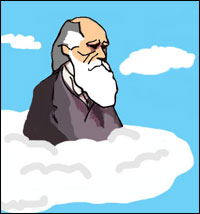Writing Right with Dmitri: Darwinian Writing
Created | Updated Jul 1, 2012
Words, words, words. That's what we're made of. Herewith some of my thoughts on what we're doing with them.
Writing Right with Dmitri: Darwinian Writing

No, I'm not talking about 'survival of the fittest' in a struggle for readers.
I'm talking about Darwins. Erasmus and Charles, to be exact. Both of them were writers – that's how they got their ideas to spread. Erasmus, Charles Darwin's grandfather, was a botanist who held many of the views about evolution that his grandson later did. However, he went about explaining them in a different way.
Erasmus was a poet. At least, he thought he was. See what you think:
Woo'd with long care, CURCUMA cold and shy
Meets her fond husband with averted eye:
Four beardless youths the obdurate beauty move
With soft attentions of Platonic love. – Erasmus Darwin, Loves of the Plants
Steamy stuff. Curcuma, by the way, is a turmeric plant.
Erasmus was doing something that is still tried today – he was trying to make science sexy. His big hero was Carolus Linnaeus, who is mentioned early in Loves of the Plants:
BOTANIC MUSE! who in this latter age
Led by your airy hand the Swedish sage,
Bad his keen eye your secret haunts explore
On dewy dell, high wood, and winding shore;
Say on each leaf how tiny Graces dwell;
How laugh the Pleasures in a blossom's bell;
How insect Loves arise on cobweb wings,
Aim their light shafts, and point their little stings. – Erasmus Darwin, Loves of the Plants
I'm not sure what the name of the Botanic Muse is, but she seems fond of Prof Linnaeus. She probably shows up 'with soft attentions of Platonic love'.
Wikipedia protests that Erasmus' anthropomorphic approach to plants 'reinforces traditional gender stereotypes'. Ya think? In addition, I personally find all this coyness, etc., a bit racy for the 18th Century, up to and including 'point their little stings'. Sort of Fanny Hill in the South Forty. Perhaps this had something to do with the fact that The Botanic Garden, of which Loves of the Plants is a part, was a bestseller. The book was more controversial for its criticism of slavery and support for the French Revolution than for its discussion of flowers' naughty bits1.
Nevertheless, Erasmus Darwin is possibly the grandfather, not only of the redoubtable Charles, but also of the TV nature series. To think, we owe all those voice-overs to him:
Crikey. . . Did you hear that?. . . It's a Mojave! Now, these guys have got quite an aggressive attitude. It's renowned as one of the hardest-hittin' rattlers. . . – Steve Irwin (the late, the great), Animal Planet

If Erasmus was the inspiration for the Crocodile Hunter, surely his grandson Charles pointed in the direction of the staider documentary:
It may be doubted whether sudden and considerable deviations of structure, such as we occasionally see in our domestic productions, more especially with plants, are ever permanently propagated in a state of nature. Almost every part of every organic being is so beautifully related to its complex conditions of life that it seems as improbable that any part should have been suddenly produced perfect, as that a complex machine should have been invented by man in a perfect state. Under domestication monstrosities sometimes occur which resemble normal structures in widely different animals. Thus pigs have occasionally been born with a sort of proboscis, and if any wild species of the same genus had naturally possessed a proboscis, it might have been argued that this had appeared as a monstrosity; but I have as yet failed to find, after diligent search, cases of monstrosities resembling normal structures in nearly allied forms, and these alone bear on the question. If monstrous forms of this kind ever do appear in a state of nature and are capable of reproduction (which is not always the case), as they occur rarely and singly, their preservation would depend on unusually favourable circumstances. – Charles Darwin, Origin of Species
Thrilling. Pass the popcorn. When do the hot babes come on?
It is a tribute to the originality of his ideas, and the accuracy of his observations, that Charles Darwin made such a splash. Because, let me tell you, it wasn't his prose style. To this day, I can remember sitting in a high school study hall, wrestling with this tome. It wasn't assigned, I was just indulging in what they called 'free reading'. I am ashamed to say that for the first time in my school years, I fell asleep in study hall. Now, if he'd included some sketches of mutant probiscised pigs, it might have helped. . .
The moral of this story? Oh, yeah, I guess you wanted one. Well, let's see. I think, children, we can learn two things from the Darwin family:
- Writing has its own evolution. Aim to do one thing, and who knows where it may lead? You might even get a TV special out of it. Or influence the future.
- Be careful how you talk about Nature.
Writing Right with Dmitri Archive
